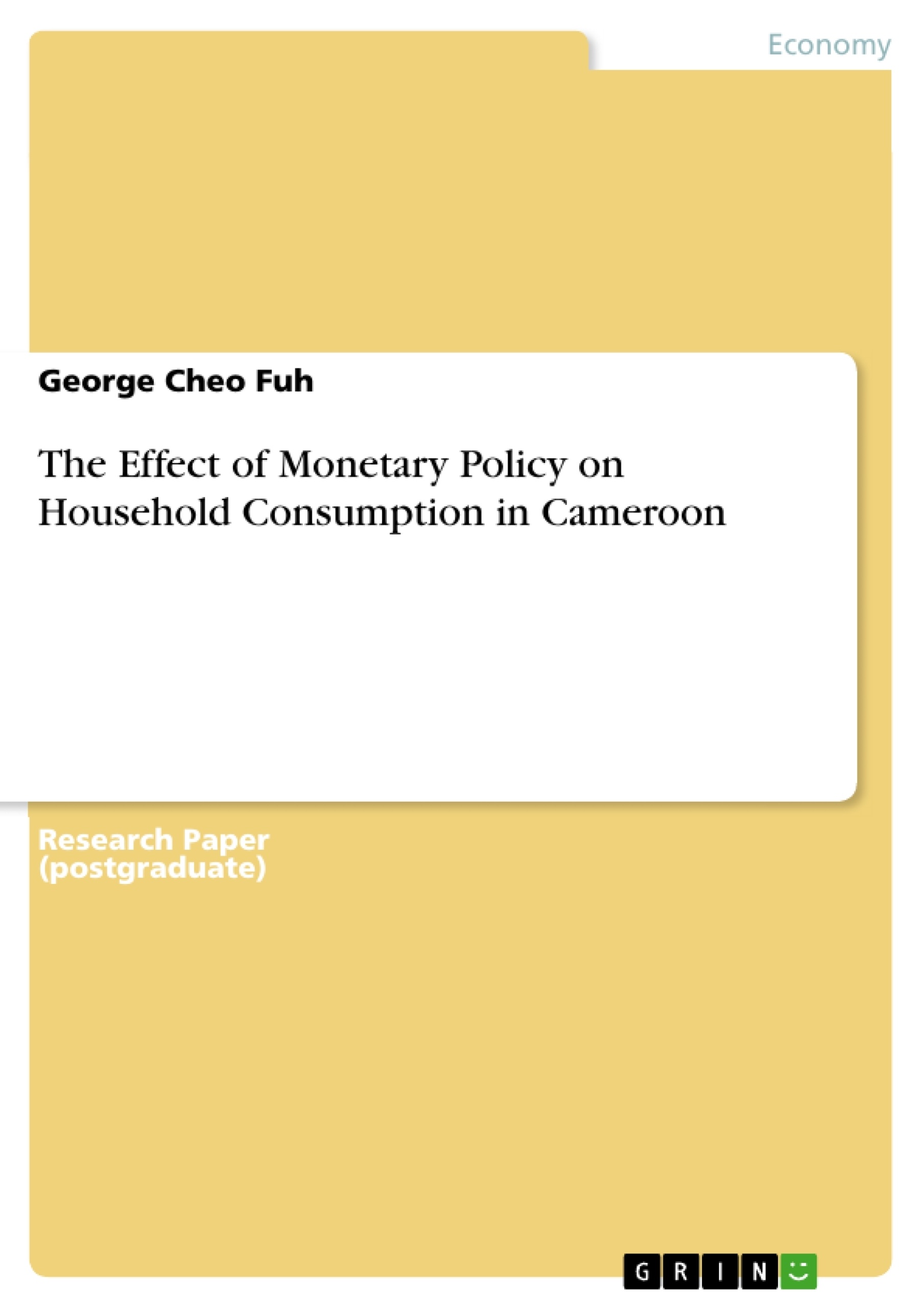The study investigates the effect of monetary policy on household consumption in Cameroon between 1980 and 2010. The objective of the study is to find out the relationship between monetary policy on household consumption in Cameroon and to recommend policies to improve on household consumption in Cameroon. The study uses secondary time series annual data from World Bank Group Development indicators for Cameroon.
The work uses economic model showing household final consumption expenditure as a function of monetary and quasi money growth, real interest rate, total reserve and Gross National Income per capita. Given the trends of the variables estimated results indicate that Total reserve as a ratio of GNP and GNI per capita positively and significantly affect household consumption. Monetary and quasi monetary growth has a negative impact on household consumption. Policy makers therefore need to encourage Total reserve and GNI per capita. It is therefore strongly recommended that instrument of monetary policy should be used in the economy as means of influencing household consumption.
Inhaltsverzeichnis (Table of Contents)
- ABSTRACT
- Introduction
- LITERATURE REVIEW
- DESCRIPTION OF DATA AND VARIABLE DEFINITIONS
- DEFINITION OF VARIABLES.
- STATISTICAL TEST
- ECONOMETRIC ANALYSIS
- CONCLUSION
- References.
Zielsetzung und Themenschwerpunkte (Objectives and Key Themes)
The study investigates the impact of monetary policy on household consumption in Cameroon during the period of 1980 to 2010. The primary objective is to explore the relationship between monetary policy and household consumption in Cameroon and to recommend strategies for enhancing household consumption in the country. The study employs secondary time series annual data from World Bank Group Development indicators for Cameroon.
- Impact of monetary policy on household consumption in Cameroon
- Role of money and quasi money growth on household consumption
- Relationship between real interest rate and household consumption
- Influence of GNI per capita on household consumption
- Appropriate monetary policies to enhance household consumption
Zusammenfassung der Kapitel (Chapter Summaries)
- ABSTRACT: The study examines the effect of monetary policy on household consumption in Cameroon between 1980 and 2010. It aims to understand the relationship between monetary policy and household consumption and recommend policies to improve household consumption. The study utilizes secondary time series annual data from World Bank Group Development indicators for Cameroon.
- Introduction: The introduction defines monetary policy as the process by which a country's monetary authority controls the money supply, often targeting an interest rate, to promote economic growth and stability. The problem statement highlights the need to examine the effectiveness of monetary policy in accelerating household consumption in Cameroon, particularly within the CEMAC Region.
- LITERATURE REVIEW: This section presents a review of existing research on the effect of monetary policies on household consumption. Studies from various countries, including the USA, European countries, Nigeria, Pakistan, and Malta, are cited to demonstrate the diverse output effects in response to common policy shocks. The review highlights the complexity of the relationship between monetary policy and consumption expenditure.
- DESCRIPTION OF DATA AND VARIABLE DEFINITIONS: This section details the data sources, which include World Bank Group annual Development reports and Cameroon's Department of Demography and Statistics. The model used is the Keynesian consumption function, which expresses the relationship between dependent and independent variables. The time series data covers the period from 1980 to 2010, chosen to account for economic and monetary phenomena such as the economic crisis of the late 1980s and the devaluation of the CFAF in the early 1990s.
- DEFINITION OF VARIABLES.: This section provides detailed definitions of the variables used in the study. These include household final consumption expenditure, money and quasi money growth, real interest rate, total reserve, and gross national income per capita.
- STATISTICAL TEST: The study uses t-statistics to determine the significance of the estimated parameters, the F-ratio to test the overall significance of the R-square and reliability of the results, standard error and R-square to measure the dispersion of the parameters.
- ECONOMETRIC ANALYSIS: This section outlines the econometric analysis conducted to assess autocorrelation, serial correlation between variables, stationarity, heteroscedasticity, and co-integration.
Schlüsselwörter (Keywords)
The study focuses on the impact of monetary policy on household consumption in Cameroon, encompassing themes such as monetary policy instruments, household consumption patterns, economic growth and stability, and macroeconomic variables.
Frequently Asked Questions
How does monetary policy affect consumption in Cameroon?
The study shows that variables like GNI per capita and total reserves positively affect household consumption, while rapid money growth can have negative impacts.
What is the Keynesian consumption function?
It is an economic model used in the study to express the relationship between household expenditure and various macroeconomic factors.
What data period was analyzed for Cameroon?
The study analyzed secondary time series annual data from 1980 to 2010, covering major economic crises and the CFAF devaluation.
What are the recommendations for policy makers?
It is recommended to use monetary policy instruments to encourage GNI per capita and maintain adequate reserves to boost domestic consumption.
What role does Gross National Income (GNI) per capita play?
GNI per capita is a significant positive driver of household final consumption expenditure in the Cameroonian economy.
- Citar trabajo
- George Cheo Fuh (Autor), 2014, The Effect of Monetary Policy on Household Consumption in Cameroon, Múnich, GRIN Verlag, https://www.grin.com/document/334214



